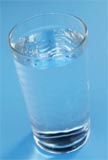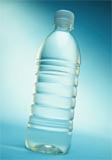Did you know, every system in your body depends on water? Here are 10 easy reasons why you should make drinking water part of your daily routine.
1. Get healthy skin. Drinking water helps to moisturize your skin from the inside out. Water is essential to maintaining elasticity and suppleness and helps prevent dryness.
2. Lose weight. Increased water consumption can help you control weight by preventing you from confusing hunger with thirst. Water will also keep your body systems, including metabolism and digestion, working properly and give you the energy (and hydration) necessary for exercise.
3. Flush toxins. By helping to flush toxins, appropriate water intake lessens the burden on your kidneys and liver.



4. Reduce your risk of a heart attack. Researchers at Loma Linda University in California studied more than 20,000 healthy men and women and found that people who drink more than five glasses of water a day were less likely to die from a heart attack or heart disease than those who drank fewer than two glasses a day.
5. Cushion and lube your joints and muscles. Water makes up a large part of the fluid that lubricates and cushions your joints and muscles. Drinking water before, during, and after exercise can also help reduce muscle cramping and premature fatigue.
6. Water helps prevent constipation.
7. Stay hydrated, get energized, and be alert. On average, most adults lose about 10 cups (1 cup = 8 oz) of fluid a day through sweating, exhaling, urinating, and bowel movements. Even minor dehydration can cause impaired concentration, headaches, irritability, and fatigue.
8. Regulate your body temperature. Perspiration is your body’s natural mechanism to control body temperature. To sweat, you need plenty of water.
9. Reduce your risk of disease and infection. Water can help prevent kidney stones and reduce your chances of getting bladder, kidney, and urinary tract infections. One study found that women who drank more than five glasses of water a day had a risk of colon cancer that was 45 percent less than those who drank two or fewer glasses a day.
10. Get well. The traditional prescription to “drink plenty of fluids” when you’re sick still holds strong. Water can help control a fever, replace lost fluids, and thin out mucus.
Sources: www.WebMD.com, www.mayoclinic.com, www.water.com
DO YOU REALLY NEED 8-10 GLASSES OF WATER A DAY?
The advice to drink eight glasses of water per day is nonsense. To remain healthy we need to take in enough water to replace the amount we lose daily through excretion, perspiration, and other bodily functions. This amount can vary widely from person to person, based upon a variety of factors such as age, physical condition, activity level, and climate.
Professor Emeritus, Heinz Valtin MD, a kidney specialist from the Department of Physiology, Dartmouth Medical School, is the author of two widely used texts on the kidney and water balance. His texts uncovers the need to satisfy an arbitrarily rigid rule about how much water we must drink every day is skewered.
There is no scientific basis for healthy adults in a temperate climate performing mild exercise to consume 8-10 glasses of water per day. The available scientific evidence suggests the contrary -that we do not require this amount of water per day to maintain health. The “8-10 glasses of water per day” can be thought of as a rule of thumb and not an absolute minimum. Just remember, not all of our water intake need come in the form of drinking water. Bottom-line, if you feel thirsty you should drink and if you don’t feel thirsty; drink only if you want to, knowing full well that you are not running the risk of insufficient water intake.
SHOULD YOU REUSE THOSE PLASTIC WATER BOTTLES?
The notion that reusing plastic water bottles causes them to break down into potentially toxic compounds is completely false!
The basis for this resides in a master’s thesis from a University of Idaho graduate student. It was then reported upon by the media despite its lack of peer review.
According to The International Bottled Water Association (IBWA):
The US Food and Drug Administration (FDA) regulates bottled water as a packaged food product and, for bottled water and all other foods and their packaging, FDA has determined that PET meets standards for food contact materials. The basis was a college student’s masters thesis that was not subject to peer review and did not reflect a level of scientific rigor that would provide accurate and reliable information about the safety of these products. Fortunately, FDA requires a much higher standard to make decisions about food contact packaging. DEHA, as mentioned in the email is neither regulated nor classified as a human carcinogen. Further, DEHA is not inherent in PET plastic as raw material, byproduct or decomposition product. DEHA has been cleared by FDA for food contact applications and would not pose a health risk even if present. DEHA is a common plasticizer used in many plastic items, many of which are found in the lab setting. For this reason, the student’s detection is likely to have been the result of inadvertent lab contamination.
Also note that PET plastics used for bottled water containers are not unique to this product type and is the same as PET plastics used to package other common foods and beverages.
Some organizations (including the IBWA) do recommend that plastic water bottles be used only once before recycling, but not because re-use is likely to cause carcinogenic compounds to leach from the plastic bottles into the liquids they hold. The concern is that people (particularly children) can too easily spread and ingest bacteria from their hands and mouths by re-using bottles without properly washing them or allowing them sufficient time to dry.
For additional information: Researcher Dispels Myth of Dioxins and Plastic Water Bottles (Johns Hopkins University)
For more info concerning dietary water & related misconceptions, click here.
